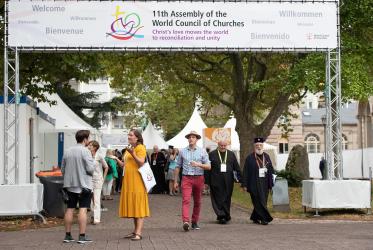Fr Rex R. B. Reyes, Jr. vividly remembers what he calls “the fateful morning of 8 November” 2013.
While attending the World Council of Churches (WCC) 10th Assembly in the Republic of Korea, he received word that Super Typhoon Haiyan had made landfall in his home country. More than 25 million people in the Philippines were in the storm's path. Reyes, a member of the WCC Central Committee and of the Episcopal Church in the Philippines, joined thousands of others at the assembly in prayer for those affected by the typhoon.
“We lifted the Philippines before God's mercy,” he said. This, he said, was an act of ecumenical solidarity. “It did not matter who the people were. It mattered that they were suffering and that they were the face of Christ. I can ensure you now that your prayers and support reached grateful hearts.”
During a discussion at the WCC Central Committee meeting on Monday, Reyes and other members of the WCC governing body reflected on the changing face of ecumenical solidarity, both in financial terms and in terms of the human spirit. Margarita Nelyubova, a Central Committee member from the Russian Orthodox Church (Moscow Patriarchate), agreed with Reyes that ecumenical sharing of resources involves different elements of trust and solidarity.
She recalled the year 2001, when the Russian Orthodox Church wanted to begin a programme to help people with HIV and AIDS. “At that time, for us, there was no church specialist in this field,” she said, “and it was very difficult to get financial support because the programme was very highly stigmatized.” Critics of the programme asked, “What can the church do about AIDS except preaching sin?” Nelyubova and others sought help from an ecumenical agency that showed what she describes as “a very high commitment to help us overcome challenges.”
Now, she said, “the AIDS programme of our church is a success story.”
Widening definition of ecumenical solidarity
As she introduced the speakers, the Rev. Gloria Ulloa Alvarado, WCC president from the Caribbean and Latin America, reflected on how “sharing resources” among churches has been viewed over the past few decades.
“This subject – sharing resources – has been a topic of great interest and concern for the ecumenical movement for more than 30 years,” said Alvarado, a member of Iglesia Presbiteriana de Colombia. “The ecumenical movement has also sought to develop further the understanding of resources so that it incorporates more than simply finances.”
But the financial aspects of ecumenical sharing simply cannot be ignored, said Roel Aalbersberg, who represented ICCO & Kerk in Actie, church-related agencies working cooperatively from their base in the Netherlands.
“Ecumenical sharing is what we try to do when we struggle with our partners against poverty and injustice. We must talk about power, especially when we talk about resources in terms of money.”
WCC's “roundtables” – in which WCC members gather with others to share perspectives on certain issues – have been a successful structure in which to nurture ecumenical sharing of all kinds, Aalbersberg added.
Participants at roundtables across the world reflect on how they can best interact and complement each other around advocacy. “A roundtable has no corners,” he said. “There is no hierarchy. The roundtable system WCC set up in 1984 is a concept that is widely embraced. It has had remarkable results.”
More about the WCC Central Committee meeting
High resolution photos available via photos.oikoumene.org



